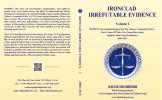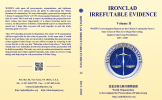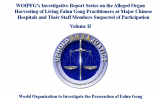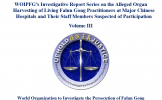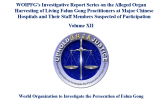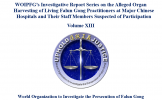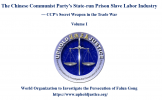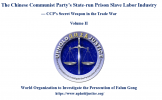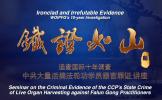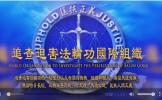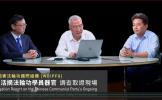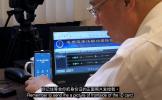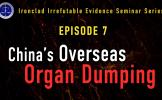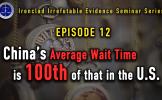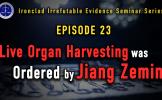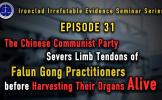Investigation Report on Phoenix Satellite Television's Background and Involvement in the Persecution of Falun Gong
The “Phoenix Satellite Television Holdings Ltd,” or Phoenix TV, is a public limited company registered in Hong Kong. On March 31, 1996, "Hong Kong Satellite TV Holdings Limited" under the Murdoch News Corporations Group, "Today's Asia Ltd" held by Liu Changle, and one of CCTV's subsidiaries "China Wise International Limited" jointly funded the Phoenix TV, taking over the Chinese channel of the former STARTV. Liu Changle was appointed Chairman of the Board and Chief Executive Officer. The "Hong Kong Satellite TV" and "Today's Asia," both were wholly-owned by Murdoch News Corporations Group, owned 45 percent of Phoenix TV; CCTV’s "China Wise International" owned 10 percent [1].
Since CCTV is forbidden to have joint ventures with foreign media, it sold all its shares of Phoenix TV to Bank of China in 1999. “China Wise International” became a wholly-owned subsidiary of Bank of China.
Phoenix TV went public in the Stock Exchange of Hong Kong Limited on June 30, 2000. Liu Changle and Murdoch each owns 37.6 percent of the company's stock, Bank of China’s China Wise International owns 8.35 percent, and the public owns 16.45 percent [2]. Liu Changle is the Chairman and Chief Executive Officer of the company.
In the fiscal year of 2002-2003, the Phoenix Info News was granted landing rights in mainland China by the China Radio, Film and Television (SARFT). As Liu Changle put it, "So far all of the overseas media have been forbidden to engage in news programs except for the English BBC, CNN and NHK, yet the SARFT now offers Phoenix TV the privilege [3].”
Phoenix TV’s Pro-CCP Stance
Phoenix Satellite TV was actually not so popular in Hong Kong. Liu Changle himself admitted this: "The television industry in Hong Kong was almost monopolized by ATV and TVB, with each occupying 30 percent and 70 percent, or 20 percent and 80 percent, of the audience, respectively. As an aged station, TVB has a lot of highly sought-after actors for drama productions. Moreover, it is very difficult to change a person's viewing habit." Due to the fierce competition in the television industry in Taiwan, Phoenix Satellite TV also found it very hard to have high ratings. So the main reason for Phoenix to survive was that it was the only Hong Kong TV station that can enter the mainland China, it does not have any competitors. While people in mainland China also think that it is really a Hong Kong television station.
Regarding the programs, Phoenix TV’s news programs contain no sensitive information at all, which can only fool the mainland television viewers, while it is impossible to meet the needs of Hong Kong and Taiwan businessmen who are eager to learn the true trends of the political and economic situations in mainland China. Most legitimate Hong Kong and Taiwan businessmen dare not to advertise with Phoenix TV because of its political background. So it can only survive on advertisements of mainland Chinese companies.
Phoenix TV does not broadcast sensitive news, even if there are a few, they have been edited to be conducive to the regime’s official point of view and perspectives of the government. The viewpoint of Phoenix TV's current affairs program is consistent with CCTV [4].
Background of Phoenix TV’s Main Shareholders
Liu Changle
Born in 1951 in Shanghai. Graduated from Communication University of China in 1983 and became a military reporter for the Central People’s Radio Station. Served as reporter, editor, news commentator and director of the editorial team. Liu participated in the reporting and commentating of many major events. While working at the Central People’s Radio Station, Liu belonged to the military ranks. Liu told Washington Post in an interview that he joined the army at the age of 19 and that by the end of 1980’s he held the rank similar to Lieutenant General [5].
In the public records held in China, Liu Changle obtained his wealth via real estate investment. “Liu Changle used to be a reporter at the Central People’s Radio Station. He immigrated overseas in 1988 and settled in Hong Kong in 1990. Liu invested in oil and real estate and made a fortune.” However, no one, including Liu himself, could explain how a reporter’s salary can afford the huge investment in oil and real estate [3].
Rupert Murdoch, News Corporation; James Murdoch, Australia News Corporation
On March 23, 2001, James Murdoch, under the direction of the Chinese regime, criticized Falun Gong at a meeting in Los Angeles and condemned some western media’s negative reports on China [6] [7]. 8 years ago, Rupert Murdoch openly told the regime officials that satellite TV is the tool against dictatorship. The consensus is that James Murdoch merely wanted to please the CCP regime to win business favors [8].
Zhou Yinan
In 1996, CCTV's subsidiary "China Wise International Limited" became a 10 percent shareholder of the Phoenix Satellite TV. As the representative of “China Wise International Ltd,” Zhou Yinan became Vice Chairman of the Board and President of Phoenix TV. In 1999, CCTV gave all shares of Phoenix TV to Bank of China. China Wise International Limited became a wholly owned subsidiary of Bank of China. Zhou Yinan left Phoenix and setup an advertising company in Shenzhen. In May 2004, Zhou Yinan and family were murdered in their home in Shenzhen [9].
Background of other high-ranking officials at Phoenix TV
Apart from Liu Changle and China Wise International Ltd’s close connection to the Chinese government, almost all high-ranking officials at Phoenix TV have been CCP officials in mainland China [10].
Wang Jiyan: Executive Vice-President and Director of Chinese Channels of Phoenix TV.
Wang served as the head of the Department of Television at Beijing Radio Television University for 10 years and deputy director of the university for 6 years. Wang is also member of the 5 person overseas media research team at the Ministry of Radio, Film and Television. At Phoenix TV, Wang was in charge of the program planning, style, content, production and management of multiple channels.
Shao Wenguang: Director of Phoenix TV Europe. Shao was the minister-counselor to the United States. He is an expert in diplomatic public relations.
Cui Qiang: Executive Vice-President of Phoenix TV. Graduated from Fudan University Department of Journalism; worked at the China Central Radio Station for 10 years; was the Managing Director of Beijing Tianhua International Cultural Arts Ltd. At Phoenix TV, Cui is in charge of the day-to-day operation and public relations. He is also one of the designers and implementers of the overall development strategy of Phoenix TV.
Yu Tonghao: Executive Vice-President of Phoenix TV. Graduated from Department of International Politics at China People’s University; Served as Director of Guangdong TV station, Director of Zhujiang Economics TV station, Associate Managing Editor of Guangdong Provincial TV Station, Deputy General Manager of CRTV; Council Member of China Radio and Television Association. Yu is in charge of advertisement and marketing at Phoenix TV.
The Phoenix TV is Jiang Zemin’s Main Propaganda Tool for the Persecution of Falun Gong
On July 22, 1999, two days after Jiang Zemin started the persecution, CCTV and other TV stations in China started to air "Real People, Real Things" [11], made by Wuhan TV Station. It was the only anti Falun Gong program at that time. In the afternoon of July 23, Phoenix TV Mandarin news anchor Dou Wentao, who was doing a live event in Sichuan Province, was urgently called back to Hong Kong. The order from the station was “to immediately show up for the shooting of a two-episode anti-Falun Gong program.” The three hour long program "Truth on Falun Gong" was finished in 6 hours [12]. Its contents were similar to CCTV's "Real People, Real Things.” Because the Phoenix TV appears as a Hong Kong station, audience from Mainland China mistakenly thought it was more objective, thus the program did more harm to Falun Gong. The program was first aired in the morning of July 25, and it was an important propaganda piece to demonize Falun Gong. Less than a week after it was first aired, the English version of the program was was published in China and overseas in VCD and DVD format on July 31. Later the Phoenix TV published a book with the same name based on the program. Liu Changle and Cui Qiang wrote preface, and Wang Jiyan wrote the postscript [13].
According to Dou Wentao, Phoenix TV began collecting Falun Gong materials after the Falun Gong practitioners' petition in Beijing on April 25, 1999. The time coincided with a sequence of Jiang Zemin's speeches, documents, and instructions related to Falun Gong. In the evening of April 25, the former CCP General Secretary Jiang Zemin wrote a letter to the members of the Politburo Standing Committee. On April 27, CPC Central Committee General Office issued a notice to print and distribute "Comrade Jiang Zemin's letter to members of the Standing Committee and related leaders." On May 8, Jiang issued notices to the Political Bureau of the CPC Central Committee, Central Committee Secretariat, and Central Military Commission. Soon afterwards, Central Committee General Office issued a notice to print and distribute the notice (Central Committee General Office document [1999] #19). On May 28, the document [1999] No.19 was passed on to provincial Standing Committees. Around June 3, the provincial Standing Committees asked people to implement document No.19. After June 11, the document passed on county regiment level. On June 7, Jiang gave a speech on "quickly handle and solve the Falun Gong issue" at a meeting of the Standing Committee. On June 10, the Central Committee formed the “leadership team to handle Falun Gong issue” and its administrative body, the "610 Office" was established. On June 13, Central Committee General Office issued another notice, "Comrade Jiang Zemin's speech on quickly handle and solve the Falun Gong issue" (Central Committee General Office document [1999] No.30) [14].
After April 25, no Mainland China media had any positive or neutral reports on Falun Gong. It is hard to believe that the Phoenix TV, which has strong CCP background, did not know the CCP was planning a full persecution on Falun Gong. From the fact that the station already had more than 100 tapes on Falun Gong in its editing room on July 24, there were only two possible reasons to make such a program: They were instructed by the CCP; or the Phoenix TV heard of something and tried to make it in order to please the CCP. CCP's official media including Guangming Daily [15] and Beijing Youth [16] reported Phoenix TV's "Truth on Falun Gong".
The Phoenix TV is CCP’s Mouthpiece
Phoenix TV news programs follow this rule: mainstream standpoint, alternative expression. Many viewers believe that Phoenix TV’s news programs and its reporters are more daring than their counterparts from mainland. This is why many mainland viewers prefer Phoenix TV.
But it is a wrong impression. In fact, the views and positions of the Phoenix TV have never deviated from that of the spokesperson of the State Council and the Ministry of Foreign Affairs. Even occasionally they may say something not to CCP's liking, but they still belong to the range of "advices and suggestions" that CCP allows. They never said anything against the propaganda policies or propaganda caliber in mainland China. On the choices of news topics, the Phoenix TV never reported sensitive news the CCP central media such as CCTV, Xinhua, or People's Daily did not report. But if CCP's central media reported on something, the Phoenix TV will certainly follow, with deeper reports, more background, and analysis, and the report will be richer and more attractive than that from the mainland media. Some typical examples include reports on Falun Gong and the case of Zhang Ziqiang [17]. On July 1, 2004, 500,000 people took part in the pro-democracy demonstration in Hong Kong. On the same day, about 60,000 people took part in the pro-CCP "celebrating Hong Kong's return" event. The Phoenix TV, like all mainland media, only reported the pro-CCP event and not the pro-democracy demonstration [18]. Liu Changle describes clearly the relationship with CCTV: "CCTV is the big brother, we are the little brother [19]." The Phoenix TV's website link appears on the official anti-Falun Gong website of the Chinese Communist Youth League, just behind the Anti-Cult Association’s website [20].
(Published in Chinese on Nov.9, 2005; Translated to English on Sep. 12, 2012)
References:
[1] The Phoenix TV: The competitive strategy in crevice(Back)
[2] Nanfang Media - 21st Century Business Herald, July 27 2001: Phoenix TV President discloses the creation and operation of Phoenix TV(Back)
[3] China Social Sciences Press: Interview with Liu Changle, Chairman of the Board of Directors of Phoenix TV(Back)
[4] The Weeds Pioneer: Background of Phoenix TV(Back)
[5] Washington Post Foreign Service. “Making Waves, Carefully, on the Air in China, Head of Private TV Network Curries Party's Favor While Testing Limits” By Philip P. Pan. Monday, September 19, 2005; A01.(Back)
[6] "News Corp. Heir Woos China With Show of Support" by Evelyn Iritani ("Los Angeles Times," March 23, 2001)(Back)
[7] "Free press and Falun Gong blasted as Murdoch woos Chinese deal" by Damien McElroy ("The Scotsman," March 26, 2001)(Back)
[8] China Internet Information Center: (UK EIU News Center May 24, 2001)(Back)
[9] Xinhua, June 1, 2004: Introduction to Zhao Yinan(Back)
[10] China News Service, September 22, 2000: Understand the Phoenix(Back)
[11] WOIPFG report: Wuhan TV Station President Zhao Zhizhen Participating in the Persecution of Falun Gong(Back)
[12] Beijing Youth Daily, July 31, 1999: A discovery of Dou Wentao(Back)
[13] The Phoenix TV - Phoenix Book: Truth on Falun Gong(Back)
[14] WOIPFG documents(Back)
[15] Guangming Wang - Wenzhai Bao, August 12, 1999(Back)
[16] Beijing Youth Daily July 31, 1999(Back)
[17] China TV August 3, 2004: Secret of the success of Phoenix TV - Mainstream standpoint, alternative expression(Back)
[18] Epoch Times December 30, 2003: The top ten news that Chinese people concern in 2003(Back)
[19] People's Daily reprints Jiangnan Times, November 2, 2004(Back)
[20] Chinese Communist Youth League website(Back)


